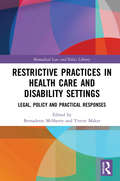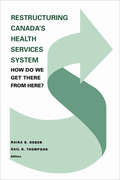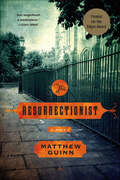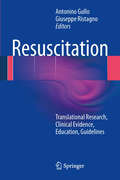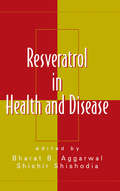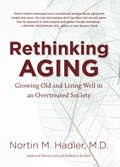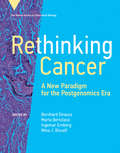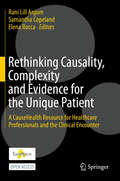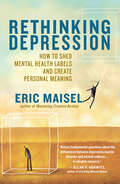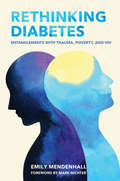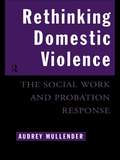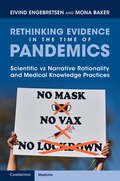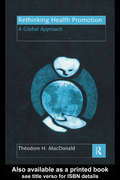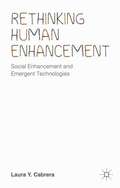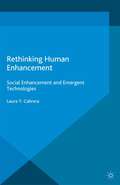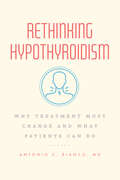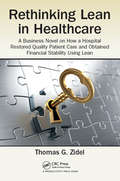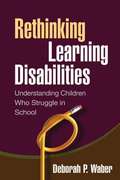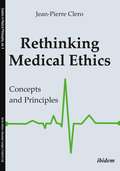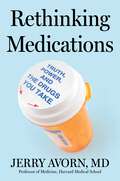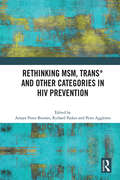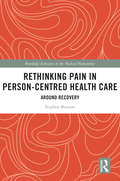- Table View
- List View
Restrictive Practices in Health Care and Disability Settings: Legal, Policy and Practical Responses (Biomedical Law and Ethics Library)
by Bernadette McSherryThis volume explores different models of regulating the use of restrictive practices in health care and disability settings. The authors examine the legislation, policies, inspection, enforcement and accreditation of the use of practices such as physical, mechanical and chemical restraint. They also explore the importance of factors such as organisational culture and staff training to the effective implementation of regulatory regimes. In doing so, the collection provides a solid evidence base for both the development and implementation of effective approaches to restrictive practices that focus on their reduction and, ultimately, their elimination across health care sectors. Divided into five parts, the volume covers new ground in multiple respects. First, it addresses the use of restrictive practices across mental health, disability and aged care settings, creating opportunities for new insights and interdisciplinary conversations across traditionally siloed sectors. Second, it includes contributions from research academics, clinicians, regulators and mental health consumers, offering a rich and comprehensive picture of existing regulatory regimes and options for designing and implementing regulatory approaches that address the failings of current systems. Finally, it incorporates comparative perspectives from Australia, New Zealand, the Netherlands, Germany and England. The book is an invaluable resource for regulators, policymakers, lawyers, clinicians, consumer advocates and academics grappling with the use and regulation of restrictive practices in mental health, disability and aged care contexts.
Restructuring Canada's Health Systems: Proceedings of the Fourth Canadian Conference on Health Economics
by Gail Thompson Raisa DeberIs the Canadian health care system becoming a victim of its own success? It has done what it set out to do – provide universal access to all medically necessary health services without financial barriers to patients – but expanding technology, an aging population, and escalating costs strain its ability to continue. It is time to explore ways to reorient and restructure the health care system and the services it provides. At the Fourth Canadian Conference on Health Economics, contributors of international reputation addressed these concerns. Their papers, collected in this volume, consider a wide range of fundamental issues related to health care policies and structures. They discuss new developments in health care delivery, assess implications of such new policies as home care and health promotion, and propose concrete alternatives for restructuring the present system to sustain universal medicine.
The Resurrectionist: A Novel
by Matthew Guinn"A fine gothic novel…Be warned: Corpses abound." —Washington PostAt South Carolina Medical College, Dr. Jacob Thacker is on probation for Xanax abuse. His interim career—working university public relations—takes an unnerving detour into the past when the bones of African American slaves are unearthed on campus.In a parallel narrative set in the nineteenth century, Nemo ("no man"), a university slave purchased for his unusual knife skills, becomes an unacknowledged member of the surgical faculty by day—and by night, a "resurrectionist," responsible for procuring bodies for medical study. An unforgettable character, by turns apparently insouciant, tormented, and brilliant, Nemo will seize his self-respect in ways no reader can anticipate.With exceptional storytelling pacing and skill, Matthew Guinn weaves together past and present to relate a Southern Gothic tale of shocking crimes and exquisite revenge.A 2014 Edgar Award Finalist for Best First Novel.
Resuscitation
by Antonino Gullo Giuseppe RistagnoResuscitation is a two-stage process comprising the achievement/maintenance of spontaneous circulation and post-resuscitation management. The approach is complex and multifaceted and entails the integration of new physiological insights, pharmacological options, and technological advances. The purpose of this volume, written by top experts in the field, is to promote, share, and disseminate new advances in resuscitation and post-resuscitation care. The issues addressed are wide ranging and of great topical interest or controversy. They include priorities of intervention, quality of resuscitation, use of mechanical supports, new defibrillation strategies, prevention of organ damage, strategies in cases of sudden cardiac death, new pharmacological treatments, and post-resuscitation care, including temperature management and prediction and improvement of outcome after cardiac arrest. Particular attention is devoted to up-to-date evidence from the most recent experimental and clinical trials on resuscitation science and to gold standard evidence-based resuscitation and post-resuscitation treatments and interventions. In addition, organizational models and integrated care systems for trauma are considered, and critical care education and the process of guideline development are reviewed.
Resveratrol in Health and Disease (Oxidative Stress And Disease Ser.)
by Bharat B. Aggarwal Shishir ShishodiaPracticing evidenced-based medicine some 25 centuries ago, Hippocrates proclaimed "Let food be thy medicine and medicine be thy food." This advice parallels the common American saying, "You are what you eat," and is supported by a National Institute of Health recommendation to consume as many as eight servings of fruits and vegetables daily to prev
Rethinking AGING
by Nortin M. HadlerFor those fortunate enough to reside in the developed world, death before reaching a ripe old age is a tragedy, not a fact of life. Although aging and dying are not diseases, older Americans are subject to the most egregious marketing in the name of "successful aging" and "long life," as if both are commodities. InRethinking Aging, Nortin M. Hadler examines health-care choices offered to aging Americans and argues that too often the choices serve to profit the provider rather than benefit the recipient, leading to the medicalization of everyday ailments and blatant overtreatment. Rethinking Agingforewarns and arms readers with evidence-based insights that facilitate health-promoting decision making. Over the past decade, Hadler has established himself as a leading voice among those who approach the menu of health-care choices with informed skepticism. Only the rigorous demonstration of efficacy is adequate reassurance of a treatment's value, he argues; if it cannot be shown that a particular treatment will benefit the patient, one should proceed with caution. InRethinking Aging, Hadler offers a doctor's perspective on the medical literature as well as his long clinical experience to help readers assess their health-care options and make informed medical choices in the last decades of life. The challenges of aging and dying, he eloquently assures us, can be faced with sophistication, confidence, and grace.
Rethinking Cancer: A New Paradigm for the Postgenomics Era (Vienna Series in Theoretical Biology)
by Bernhard Strauss, Marta Bertolaso, Ingemar Ernberg, and Mina J. Bissell et al.Leading scientists argue for a new paradigm for cancer research, proposing a complex systems view of cancer supported by empirical evidence.Current consensus in cancer research explains cancer as a disease caused by specific mutations in certain genes. After dramatic advances in genome sequencing, never before have we known so much about the individual cancer cell--and yet never before has it been so unclear what to do with this knowledge. In this volume, leading researchers argue for a new theory framework for understanding and treating cancer. The contributors propose a complex systems view of cancer, presenting conceptual building blocks for a new research paradigm supported by empirical evidence.The contributors first discuss the new research framework in terms of theoretical foundations and then take up the relevance of a systems approach, reviewing such topics as nonlinearity, recurrence after treatment, the cellular attractor concept, network theory, and non-coding DNA--the "dark matter" of our genome. They address the temporality of cancer progression, drawing on evolutionary theory and clinical experience. Finally, they cover the dominant role of the tissue microenvironment in cancer, analyzing topics including altered metabolic pathways, the disease-defining influence on metastasis, and the interconnectedness of different environmental niches across levels of organization.
Rethinking Causality, Complexity and Evidence for the Unique Patient: A CauseHealth Resource for Healthcare Professionals and the Clinical Encounter
by Rani Lill Anjum Samantha Copeland Elena RoccaThis open access book is a unique resource for health professionals who are interested in understanding the philosophical foundations of their daily practice. It provides tools for untangling the motivations and rationality behind the way medicine and healthcare is studied, evaluated and practiced. In particular, it illustrates the impact that thinking about causation, complexity and evidence has on the clinical encounter. The book shows how medicine is grounded in philosophical assumptions that could at least be challenged. By engaging with ideas that have shaped the medical profession, clinicians are empowered to actively take part in setting the premises for their own practice and knowledge development. Written in an engaging and accessible style, with contributions from experienced clinicians, this book presents a new philosophical framework that takes causal complexity, individual variation and medical uniqueness as default expectations for health and illness.
Rethinking Depression: How to Shed Mental Health Labels and Create Personal Meaning
by Eric MaiselIn this provocative and pathbreaking distillation of a career spent working with individuals seeking help with mood and motivation, Eric Maisel reveals the implications of one of the most dramatic cultural shifts of our time. In recent decades, much of the unhappiness inherent in the human condition has been monetized and labeled as the disease of depression and related “disorders.” Maisel persuasively critiques this sickness model and prescribes a potent new therapy. The existential cognitive-behavioral therapy (ECBT) he details here marries the proven methods of CBT with the powerful meaning-based orientation of existential therapy. The result is a revolutionary reimagining of life’s difficulties and a liberating model of self-care that optimizes the innate human ability to create meaning and seize opportunity — in any circumstance.
Rethinking Diabetes: Entanglements with Trauma, Poverty, and HIV
by Emily MendenhallIn Rethinking Diabetes, Emily Mendenhall investigates how global and local factors transform how diabetes is perceived, experienced, and embodied from place to place. Mendenhall argues that the link between sugar and diabetes overshadows the ways in which underlying biological processes linking hunger, oppression, trauma, unbridled stress, and chronic mental distress produce diabetes. The life history narratives in the book show how deeply embedded these factors are in the ways diabetes is experienced and (re)produced among poor communities around the world.Rethinking Diabetes focuses on the stories of women living with diabetes near or below the poverty line in urban settings in the United States, India, South Africa, and Kenya. Mendenhall shows how women's experiences of living with diabetes cannot be dissociated from their social responsibilities of caregiving, demanding family roles, expectations, and gendered experiences of violence that often displace their ability to care for themselves first. These case studies reveal the ways in which a global story of diabetes overlooks the unique social, political, and cultural factors that produce syndemic diabetes differently across contexts.From the case studies, Rethinking Diabetes clearly provides some important parallels for scholars to consider: significant social and economic inequalities, health systems that are a mix of public and private (with substandard provisions for low-income patients), and rising diabetes incidence and prevalence. At the same time, Mendenhall asks us to unpack how social, cultural, and epidemiological factors shape people's experiences and why we need to take these differences seriously when we think about what drives diabetes and how it affects the lives of the poor.
Rethinking Domestic Violence: The Social Work and Probation Response
by Audrey MullenderFirst published in 1996. Routledge is an imprint of Taylor & Francis, an informa company.
Rethinking Evidence in the Time of Pandemics: Scientific vs Narrative Rationality and Medical Knowledge Practices
by Eivind Engebretsen Mona BakerThe COVID-19 crisis has transformed the highly specialized issue of what constitutes reliable medical evidence into a topic of public concern and debate. This book interrogates the assumption that evidence means the same thing to different constituencies and in different contexts. Rather than treating various practices of knowledge as rational or irrational in purely scientific terms, it explains the controversies surrounding COVID-19 by drawing on a theoretical framework that recognizes different types of rationality, and hence plural conceptualizations of evidence. Debates within and beyond the medical establishment on the efficacy of measures such as mandatory face masks are examined in detail, as are various degrees of hesitancy towards vaccines. The authors demonstrate that it is ultimately through narratives that knowledge about medical and other phenomena is communicated to others, enters the public space, and provokes discussion and disagreements. This title is also available as Open Access on Cambridge Core.
Rethinking Health Promotion: A Global Approach
by Theodore H. MacDonaldIn today's world 'health' means far more than merely the absence of illness. In Rethinking Health Promotion Theodore H. MacDonald sweeps away the confusion surrounding the function and position of health promotion. He argues that, far from being a modern innovation, health promotion has existed as a distinct and separate enterprise for as long as biomedicine and cautions against health promotion becoming organized merely an off-shoot of medical care. Drawing on the author's experience as a World Health Organisation consultant, the book also tackles the question of whether health promotion has relevance on an international scale or whether it is purely a eurocentric phenomenon. Against this background individual chapters explore universal factors such as sexual health, diet, unemployment, alcohol and tobacco use. With its critical and historical approach this book breaks new ground in assessing health promotion and will be stimulating reading for the wide variety of students and professionals studying health promotion.
Rethinking Human Enhancement: Social Enhancement and Emergent Technologies
by Laura Y. CabreraThis book discusses three possible human enhancement paradigms and explores how each involves different values, uses of technology, and different degrees and kinds of ethical concerns. A new framework is advanced that promotes technological innovation that serves the improvement of the human condition in a respectful and sustainable way.
Rethinking Human Enhancement: Social Enhancement and Emergent Technologies
by Laura Y. CabreraThis book discusses three possible human enhancement paradigms and explores how each involves different values, uses of technology, and different degrees and kinds of ethical concerns. A new framework is advanced that promotes technological innovation that serves the improvement of the human condition in a respectful and sustainable way.
Rethinking Hypothyroidism: Why Treatment Must Change and What Patients Can Do
by Antonio C. Bianco, MDIn this primer for patients, their families, and their doctors, a leading physician and scientist explains why the standard treatment for hypothyroidism fails many—and offers an empowering call for change. Hypothyroidism, also commonly referred to as Hashimoto’s disease, affects millions in the United States alone. It occurs when the thyroid—the butterfly-shaped gland that sits in your neck right above the front of your shirt collar—malfunctions or after thyroid surgery, causing thyroid hormone levels in circulation to drop below normal. Thus, treatment is aimed at bringing these hormone levels back to normal. This is done with daily tablets of thyroxine or T4. Because hypothyroidism is so common, we likely know someone who is on this type of medication. While most patients respond well to this standard treatment, about ten to twenty percent (some two to three million individuals in the United States) are far from living a typical life. They exhibit “foggy brain”—low energy, confusion, and poor memory. Many doctors have shrugged off their complaints, believing these symptoms to be unrelated to the thyroid disease. In Rethinking Hypothyroidism, Dr. Antonio C. Bianco, a physician and a scientist who has studied hypothyroidism and thyroid hormones for decades, offers an accessible overview of the disease’s treatment and the role of big pharma in shaping it, making the case that the current approach is failing many patients. But more than this, Bianco calls for alternatives to improve lives, and he equips patients and their families with the tools to advocate for other treatments.
Rethinking Hypothyroidism: Why Treatment Must Change and What Patients Can Do
by Antonio C. Bianco, MDIn this primer for patients, their families, and their doctors, a leading physician and scientist explains why the standard treatment for hypothyroidism fails many—and offers an empowering call for change. Hypothyroidism, also commonly referred to as Hashimoto’s disease, affects millions in the United States alone. It occurs when the thyroid—the butterfly-shaped gland that sits in your neck right above the front of your shirt collar—malfunctions or after thyroid surgery, causing thyroid hormone levels in circulation to drop below normal. Thus, treatment is aimed at bringing these hormone levels back to normal. This is done with daily tablets of thyroxine or T4. Because hypothyroidism is so common, we likely know someone who is on this type of medication. While most patients respond well to this standard treatment, about ten to twenty percent (some two to three million individuals in the United States) are far from living a typical life. They exhibit “foggy brain”—low energy, confusion, and poor memory. Many doctors have shrugged off their complaints, believing these symptoms to be unrelated to the thyroid disease. In Rethinking Hypothyroidism, Dr. Antonio C. Bianco, a physician and a scientist who has studied hypothyroidism and thyroid hormones for decades, offers an accessible overview of the disease’s treatment and the role of big pharma in shaping it, making the case that the current approach is failing many patients. But more than this, Bianco calls for alternatives to improve lives, and he equips patients and their families with the tools to advocate for other treatments.
Rethinking Hypothyroidism: Why Treatment Must Change and What Patients Can Do
by Antonio C. Bianco, MDIn this primer for patients, their families, and their doctors, a leading physician and scientist explains why the standard treatment for hypothyroidism fails many—and offers an empowering call for change. Hypothyroidism, also commonly referred to as Hashimoto’s disease, affects millions in the United States alone. It occurs when the thyroid—the butterfly-shaped gland that sits in your neck right above the front of your shirt collar—malfunctions or after thyroid surgery, causing thyroid hormone levels in circulation to drop below normal. Thus, treatment is aimed at bringing these hormone levels back to normal. This is done with daily tablets of thyroxine or T4. Because hypothyroidism is so common, we likely know someone who is on this type of medication. While most patients respond well to this standard treatment, about ten to twenty percent (some two to three million individuals in the United States) are far from living a typical life. They exhibit “foggy brain”—low energy, confusion, and poor memory. Many doctors have shrugged off their complaints, believing these symptoms to be unrelated to the thyroid disease. In Rethinking Hypothyroidism, Dr. Antonio C. Bianco, a physician and a scientist who has studied hypothyroidism and thyroid hormones for decades, offers an accessible overview of the disease’s treatment and the role of big pharma in shaping it, making the case that the current approach is failing many patients. But more than this, Bianco calls for alternatives to improve lives, and he equips patients and their families with the tools to advocate for other treatments.
Rethinking Informed Consent in Bioethics
by Neil C. Manson Onora O'NeillManson and O'Neill show why informed consent cannot be fully specific or fully explicit, and why more specific consent is not always ethically better.
Rethinking Lean in Healthcare: A Business Novel on How a Hospital Restored Quality Patient Care and Obtained Financial Stability Using Lean
by Thomas G. ZidelThis book deals with a hospital's struggle to secure and maintain financial stability. In the story, the leadership team of a fictional hospital adopts the tools and principles associated with the Toyota Production System or Lean. The story takes the reader through leadership's arduous journey from rejecting the methodology to embracing it, to successful implementation. This book is important because many of our nation's hospitals are besieged with financial difficulties with declining reimbursement and the public is losing confidence in our hospital's ability to provide quality care without error. Lean can provide relief from these issues but only if it is properly implemented.
Rethinking Learning Disabilities: Understanding Children Who Struggle in School
by Deborah WaberExperts have yet to reach consensus about what a learning disability is, how to determine if a child has one, and what to do about it. Leading researcher and clinician Deborah Waber offers an alternative to the prevailing view of learning disability as a problem contained within the child. Instead, she shows how learning difficulties are best understood as a function of the developmental interaction between the child and the world. Integrating findings from education, developmental psychology, and cognitive neuroscience, she offers a novel approach with direct practical implications. Detailed real-world case studies illustrate how this approach can promote positive outcomes for children who struggle in school.
Rethinking Medical Ethics: Concepts and Principles (Studies In Medical Philosophy Ser. #4)
by Jean-Pierre CleroIn this unique study, Jean-Pierre Clero examines medical ethics from a philosophical perspective. Based on the thoughts of great philosophers, he develops a theory of medical ethics that focuses on the values of intimacy.
Rethinking Medications: Truth, Power, and the Drugs You Take
by Jerry AvornA leading medical expert explains why too many of the medications Americans take are poorly evaluated, overpriced, or pose unwarranted risks—and what we can do to fix that.Groundbreaking research has given us many remarkable new medicines, but America&’s drug evaluation process, once the envy of the world, is being seriously compromised. Under pressure from drugmakers, the FDA has been lowering its approval standards and has let poorly effective or risky products enter the market—while our prescription prices, the highest in the world, put crucial treatments beyond the reach of many. In Rethinking Medications, Dr. Jerry Avorn explains how we got here and what we can do to ensure that our medicines are dependably effective, safe, and affordable. Part of the problem is the power of pharma&’s biggest-in-Washington lobbying clout, which influences members of Congress from both parties. That leverage is extended by the FDA&’s growing dependence on fees the industry pays to get its drugs approved. The increasingly revenue-driven US healthcare system shapes the way doctors prescribe medications—sometimes to the detriment of their clinical decisions. Based on his decades of practice and research at Harvard Medical School and his role at the very center of many of these controversies, Dr. Avorn presents compelling clinical illustrations of these issues across the medical spectrum: from cancer drugs to opioids, from treatments for rare diseases to psychedelics. Throughout, he offers practical steps that consumers, policymakers, and practitioners can take to address these problems—at a moment when our assumptions about scientific evidence, regulation, pricing, and the role of government are being contested as never before.
Rethinking MSM, Trans* and other Categories in HIV Prevention
by Amaya Perez-Brumer Richard Parker Peter AggletonAs the HIV epidemic moves into its fourth decade, it is clear that the global response has failed to adequately address the needs of a wide range of vulnerable populations and groups. Chief among these are gay, bisexual and other men who have sex with men, and transgender persons, who globally face the disproportional burden of HIV infection. This volume rethinks HIV prevention and health promotion for sexual and gender minorities – in both the industrialised societies of the West, as well as in the developing nations of the Global South. The chapters it contains offer a critical analysis of past and present HIV research employing categories to designate gay and other men who have sex with men, transgender persons, and/or other persons and communities with diverse gender and sexual identities. Contributors question the politics of many of the existing classifications and categories in HIV research and argue for a more sophisticated analysis of gender and sexual diversity in order to tackle the social and political barriers that impede the design of successful HIV prevention and health promotion approaches. This book was originally published as a special issue of Global Public Health.
Rethinking Pain in Person-Centred Health Care: Around Recovery (Routledge Advances in the Medical Humanities)
by Stephen BuetowThis book explores how person-centred health care could be refined to help persons alleviate pain-related distress and construct pain as a potentially positive experience. Rethinking Pain in Person-Centred Health Care is a fascinating contribution to the multidisciplinary literature on person-centred health care, pain and ethics. Traditionally, Western intellectual culture has downplayed the intuitive and emotional, promoting instead rational, natural-scientific perspectives. Applied to pain, an instrumental approach promotes the immediate and effective relief of pain, due to the widespread suffering and expense it can cause. However, different persons experience pain in different ways and Buetow moves beyond a commitment to eliminate pain to exploring how benefits of pain could include creating and managing meaning from pain. Rather than always looking to put pain behind them, persons may flourish by moving around pain, through pain, into pain and above pain. Buetow argues that this model depends on adopting a person-centred approach to health care, focusing less on the condition of pain and more on mobilizing the persons who present with, and manage, pain. This book will be of interest to professionals and academics/researchers in the fields of psychology and psychiatry who have a special interest in people with persistent pain conditions. It will also be an invaluable resource for physiotherapists, chronic pain consultants in secondary care and GPs.
